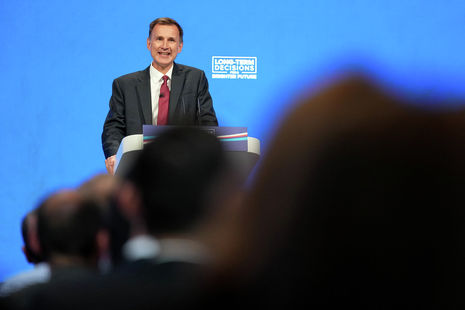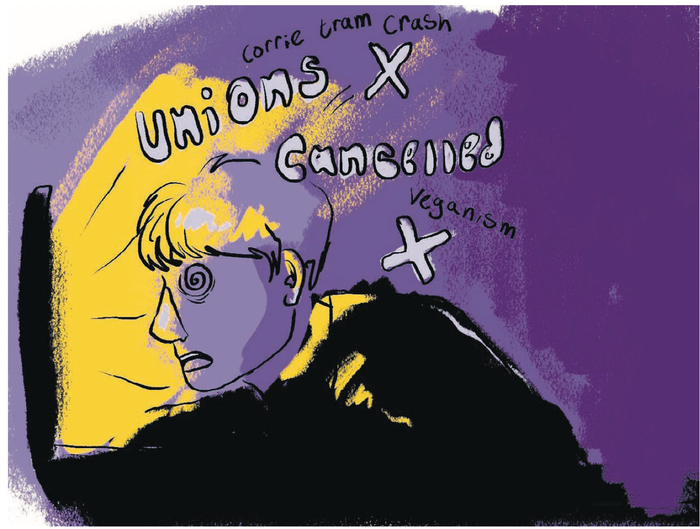A tale of two conferences
The party conferences held this month have cemented the positioning of the British political parties in the build up to the election

The beginning of autumn means jumpers, pumpkin patches and leaves turning orange. To the politically-inclined among us, it signifies the start of one of the most exciting periods in the British political calendar: Party conference season.
The Conservatives arrived in Manchester two weeks ago looking to dispel the countless dark clouds currently circling overhead. A seemingly insurmountable poll lead, chasmic divisions among leading party figures, and general apathy from the membership provided a difficult backdrop for a conference in which Sunak set out to present himself as the “change” candidate in next year’s general election, and his party as being firmly united behind him.
This lasted all of a morning.
Almost as soon as Conference started, the fundamental splits in Sunak’s party were on show. In his first interview round of the week, Levelling Up Secretary Michael Gove called on Sunak to cut taxes before the next general election, despite his leader consistently stating he would do no such thing.
In a similarly divisive vein, Liz Truss and her allies spent the conference whipping up crowds at fringe events, as she continued to make the case that, despite her being outlasted as Prime Minister by an iceberg lettuce last year, she was always in the right. Delegates flocked to see the likes of her, Priti Patel and Jacob Rees-Mogg taking snide shots at party leadership, highlighting Tory cracks for all to see.
This sort of factionalism severely undermined Sunak’s authority at an event where he was supposed to be presenting himself as being in control. He appeared weak and listless, and certainly not someone who could convincingly win a parliamentary majority. Even in his keystone conference speech, the one part of the week he had full control over, the PM obfuscated, U-turned and tried to stoke the fires of the so-called ‘Culture Wars’.
After announcing the cancellation of the HS2 rail link between Manchester and Birmingham (in Manchester), and attacking Net Zero, Sunak proceeded to use the British trans community as little more than a verbal punching bag to win him a depressingly large amount of applause from the hall of delegates. A thoroughly unnecessary and morally bankrupt move from a PM demonstrating, once again, that he leads a party of intolerance.
What is most telling about this, though, is the fact that when it comes to the ‘Culture Wars’, Sunak himself seems as if he’d rather be talking about anything else. He comes across as particularly stiff, unenthusiastic and solidly out of place. It’s evident the wannabe Silicon Valley Tech Bro is silently upset by the fact that the only possible way for him to win a general election is to divert attention entirely away from the economy, business and innovation. Still, it doesn’t stop him from doing it.
All of this added up to give the Conference a sense of chaotic desperation. Many MPs and party members appeared already resigned to losing next year, and those who didn’t evoked the band on the Titanic playing Nearer, My God, To Thee while sinking further and further into electoral oblivion.
“All of this added up to give the Conference a sense of chaotic desperation”
The mood could not have been more different for the Labour Party as they rolled into Liverpool four days later.
Recent by-election victories, and just general Conservative misfortune had delegates feeling ebullient and ready to enjoy what turned out to be a reassuring, yet wholly unremarkable, conference.
Unremarkable is, in this context, a good thing. There were no cringe-worthy viral moments, car crash speeches, or gaffes that could have run the risk of overshadowing the event. Labour kept the focus on their slate of admittedly rather centrist policies, and appeared far more competent than the travelling circus that had pitched up on the banks of the Irwell River the week before.
The only thing close to a dramatic moment was when Starmer’s speech on the final day was interrupted by a protester who covered the MP in purple glitter. Instead of allowing it to ruin the speech, the usually insipid Starmer quite literally shook it off, rolled up his sleeves and went on to deliver one of his strongest ever performances as leader. He came out looking better than ever, confirmed by the frenzied applause from the conference floor.
Perhaps this is an indication that his work to drag the party towards the political centre is working. Fringe events were, for the most part, free from any hard-left discussions, and the likes of Amazon, Google and Goldman Sachs all had significant presences in the exhibition hall. It’s been said a thousand times before, but Labour do, genuinely, look like a government-in-waiting.
While no one in the Shadow Cabinet would dare admit it, the whole thing felt, at times, like an early victory lap. With a poll lead that even they would struggle to squander, and none of the infighting that cast a long shadow over the Tories’ gathering, the event demonstrated a party united, regardless of how (and by expelling whom) this unity was achieved.
It truly was a Tale of Two Conferences. The despondent, desperate and farcical nature of the Tory Conference contrasted starkly with the quietly successful, touching on self-congratulatory, Labour alternative. There may yet be a route back from the dead for the Conservatives ahead of the next general election, as unlikely as it may seem. However, their performance at Conference suggests that, at this moment in time, they are certainly not heading in this direction.
 News / Cambridge students set up encampment calling for Israel divestment6 May 2024
News / Cambridge students set up encampment calling for Israel divestment6 May 2024 News / Cambridge postgrad re-elected as City councillor4 May 2024
News / Cambridge postgrad re-elected as City councillor4 May 2024 News / Proposed changes to Cambridge exam resits remain stricter than most7 May 2024
News / Proposed changes to Cambridge exam resits remain stricter than most7 May 2024 News / Some supervisors’ effective pay rate £3 below living wage, new report finds5 May 2024
News / Some supervisors’ effective pay rate £3 below living wage, new report finds5 May 2024 Fashion / Class and closeted identities: how do fits fit into our cultures?6 May 2024
Fashion / Class and closeted identities: how do fits fit into our cultures?6 May 2024






